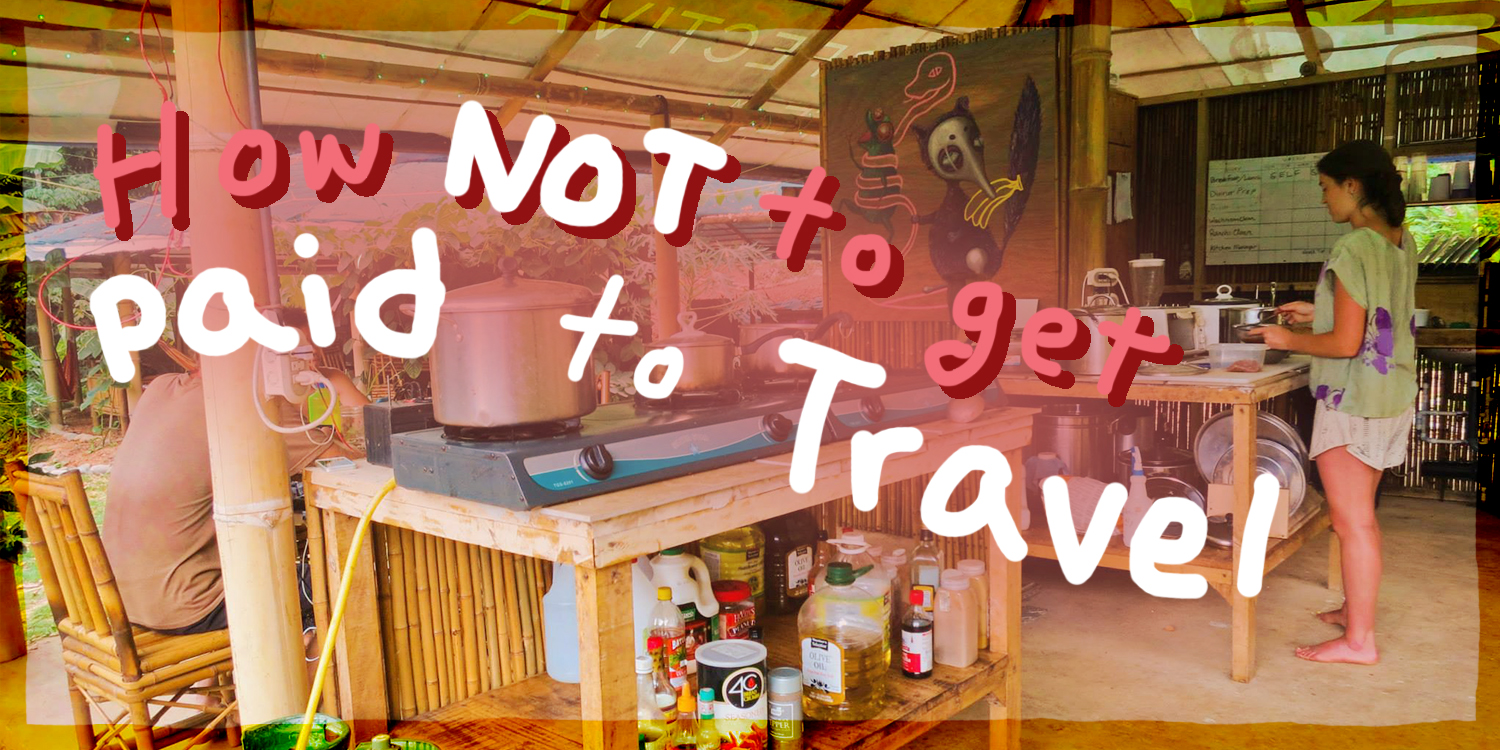Nobody begins the nomadic journey as an expert. Like those of us who have been doing this for years, you’ll have to start somewhere, anywhere. You just want to get up and go.
Maybe you’re attracted to a particular niche: being a seasonal adventure worker, a digital nomad, a vanlifer, a WWOOFer. And among the oceans of travel blogs you’ll find truly useful information about how to unmoor into any of these alluring currents. But you’ll also encounter eddies and rip tides that may spin you in the wrong direction. They’ll be disguised as clever ideas by well-meaning travel bloggers. But steel yourself against these sirens: not all treasure maps lead to treasure.
There are hundreds of blog posts around the internet with matching lists of ways to get paid to travel and to make money on the road. Many of these posts exist in an echo-chamber of ideas, blogger after blogger copying one another’s content without due diligence. As a long-term traveler (10+ years of changing addresses!) and with the majority of my connections in the traveling community, I’ve heard and seen it all. The following is a list of things to avoid. AKA: how not to get paid to travel.
Things Not to Sell to Fund Your Travels
- Photos on micro licensing sites
Unless you’re already a professional photographer and you also happen to be excellent at market research, posting the photos you just happen to take while traveling is only going to be a frustrating waste of (lots and LOTS of) time.
If you are a professional photographer, you’re much better off taking any other number of routes to make money with your art, instead of sharing them on a commercial site oversaturated with competition.
Most people who submit their photos to sites like shutterstock make enough for a cup of coffee or very slightly more. And many people who fancy themselves photographers aren’t looking at their own work objectively. Photography is a real skill that takes a lot of time and energy to master. If this is not your life calling, invest your efforts elsewhere. - Essential oils (and other pyramid scheme products)
Let’s do some fun math.
-People I’ve met who sell essential oils: A lot more than 0.
-People I know of who have made money selling oils: 0.
-People I know personally who have bought oils for themselves from their own business and actually owe money to the pyramid company: at least 3.
Don’t get involved in pyramid schemes. Love on your friends, but when they try to get you to sell the things that they bought from somebody else to sell, give them a hard no.
The fancy rebranded term for pyramid schemes is now MLM, or multi-level marketing. But draw out the sales map, and wouldn’t you know it, the shape is a pyramid. Always do your research if a business opportunity sounds too good to be true. - Crafts
This one may be a bit more of a bubble burst, because it can feel personal. Even if your family or friends encourage you to sell an artsy product you’ve made, it’s unlikely that you’ll be able to make a decent living with it without an insane amount of time and energy. There is so much fantastic handiwork out there and such a low ratio of people making decent profits.
Etsy, like crowdfunding, is not a site where you can just post your stuff and hope the people come. It’s better for other uses- for example, meeting the increasing demands of a brick and mortar store or selling extremely specific, practically useful niche products.
Street sales are not usually big money makers either. If you do a bit of research on setting up a booth at a fair, you’ll notice that most crafters barely break even and many lose money. It’s more of a work of personal passion than a work of personal finance. Which is personally fine, if that’s what you love doing. - Your stuff
Selling your belongings is obviously not a terrible idea in and of itself, but you can only sell your stuff once. It’s not really a plan that will sustain your long-term travels. You’re also unlikely to make very much from the sale of used goods, especially at a garage sale. - Your eggs
Harvesting a woman’s eggs (so that other women may have children) is an extremely invasive process. Many people are drawn in by the money, which for those in desperate situations, can seem like an incredible sum. But make no mistake, this is a highly involved undertaking involving hormones and surgery. Unlike sperm donation, egg donation comes with long-term health risks.
That said, I know people who have done it and it’s worked out fine. Just sleep on it.
Jobs Not to Take to Make Money Traveling
- Campground host
Camp hosting is most popular among older workampers- people traveling the America in RVs. Too many of these jobs are incredibly sketchy, with many employers requiring hosts to work or be on call nearly constantly (well above and beyond their contracts) for no extra pay. Work is a lot of tough labor, too. And dealing with misbehaving campers.
The main benefit to most hosts is a free place to park an RV, but the bad jobs seem to heavily outweigh the good jobs, if the online reviews are to be believed. Though to be fair, there are some people who really love hosting, and it is possible to find those good jobs with the help of popular workcamping blogs and websites. - Amazon Camperforce
Work at Amazon warehouses (usually undertaken by RV workampers) is notoriously grueling, and frankly, it’s shocking that the working conditions aren’t illegal. During the holiday season, Amazon needs tons of extra staff to walk incredibly long distances for incredibly long shifts in incredibly mind-numbing warehouses. Many workers leave with health problems, and many are taken unceremoniously to the hospital in ambulances.
Read Nomadland, an amazing look into the daily lives of workampers and the people who make up the Amazon Camperforce. - Human guinea pig for pharmaceutical companies
Huge yikes on this one, for the direct risks to your health. Big pharma is questionable at the best of times- you certainly shouldn’t trust that the drugs they give you won’t harm you when they are still in the testing phase. Don’t let people pump you full of unknown, suspicious substances. - Join a traveling circus
I feel like this one probably speaks for itself. You tell me, do you want to join a traveling circus? I mean, I won’t stop you, but if you really want an adventurous travel job, here is a list of 100+ resources, including dozens of sites for adventure travel jobs with housing.
Online Ideas to Avoid to Make Money on the Road
- Start a travel blog
I’ve done this myself, twice, and to be fair, I was one of the success stories (albeit a mild one). Do I recommend it for others? Absolutely not. Blogging is an extremely time consuming process, and writing dozens and hundreds of long (1000+ words), useful, high quality posts is only the very first step toward making money.
There’s a huge learning curve (you’ll need to master SEO, keyword research, wordpress, bluehost, google analytics, mailchimp, backlinks, and social media, only a few of the new things that will make your head spin) and a lot of marketing research involved. And with so many travel bloggers touting the miracle pill of starting a travel blog yourself, the field is already highly competitive.
The function of a blog for most businesses is marketing; a blog isn’t usually a product within itself. A blog needs to draw an audience and entice them to poke around your site to see what you’re actually selling, whether that be ebooks or refrigerator installation services.
When I had my first travel blog, I did it a bit backwards. I wrote articles to get people to my website, though I didn’t sell anything at first. I only provided links to Amazon products, tracked what people bought, and then made my own versions of those things to sell later. It worked like a charm, but over a looong period of time.
So while most people won’t make money writing about travel, there are creative caveats and when you succeed, it sure is fun. - Answer surveys
For a few cents per survey? Are you serious? If there is any way to thoroughly turn yourself into a cheap commodity through and through, it’s by spending your free time filling out surveys online. You’ll earn more at (almost) literally any other job.
Before looking into filling out surveys for money, ask yourself how much you think your time is worth. Unless it’s less than $1 per hour, run in the other direction. - Use Fiverr
The McDonald’s of freelancing sites, Fiverr is a place where people go to buy (usually) cheap, shoddy services from people with little experience. It’s not a place to go to offer that experience and try to make money. The name Fiverr, in fact, is a misspelling of the slang “fiver,” a five dollar bill. Your work isn’t worth much here. You might as well fill out some online surveys while you’re at it.
If you’ve got an actual marketable skill, take it to a more niche site that caters to your expertise. - Be an Instagram influencer
It isn’t that influencers don’t make money- they do- but the problem is in the way this idea is suggested, as if one can just magically “be” an influencer.
For the same reasons you can’t just “be” a successful travel blogger or photographer, you can’t just “be” an influencer. There’s a steep learning curve and the climb to the top is slow and challenging in an already saturated market. If you don’t have specific expertise in Instagram, photography, and marketing, this isn’t where you’ll want to focus your efforts. - Crowfunding
It’s a misconception that if you post a cool idea to a crowfunding site, crowdfunders will come. As with anything online, there are no results without marketing. People who are able to gather enough money for their projects on these sites usually rely on a network they’ve already put a lot of time and effort into building, whether personally or professionally. Crowdfunding websites don’t provide the network for you. - Daytrading
Buying and selling stocks is confusing. Nobody can beat the system in the long run through the volatile methods of daytrading. There are much better investment plans that also don’t require you to make them your full time job.
Of course, as with everything in life, there are people succeeding at all of these “bad ideas.” The exceptions who prove the rules. Could you be one of them? Sure. But it will take creativity, intelligence, and perseverance to avoid the pitfalls that turn most people into statistics and to do something unique and valuable. There are easier (and much more enjoyable) routes.
So now that you know what suggestions you need to look out for, you’re well prepared to recognize the better ones! Want to learn the things that do work? Get some tips on How to Get Paid to Travel: Master List of Ideas That Actually Work. Good luck, wanderer!

